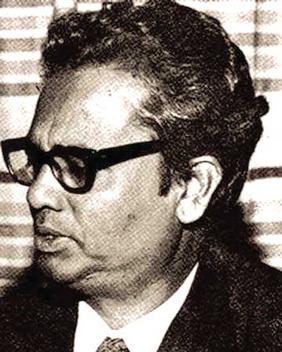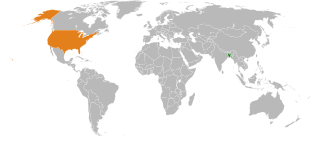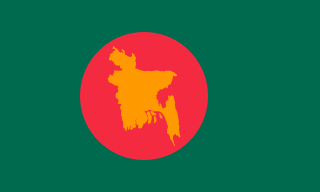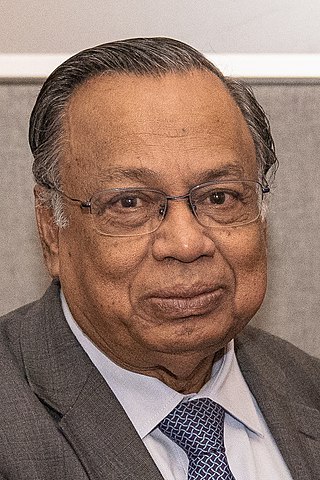
The United Nations (UN) is a diplomatic and political international organization with the intended purpose of maintaining international peace and security, develop friendly relations among nations, achieve international cooperation, and serve as a center for coordinating the actions of member nations. It is widely recognised as the world's largest international organization. The UN is headquartered in New York City, in international territory with certain privileges extraterritorial to the United States, and the UN has other offices in Geneva, Nairobi, Vienna, and The Hague, where the International Court of Justice is headquartered at the Peace Palace.

The Bangladesh Armed Forces are the military forces of the People's Republic of Bangladesh. They consist of the three uniformed military services: the Bangladesh Army, the Bangladesh Navy and the Bangladesh Air Force. The Armed Forces are under the jurisdiction of Ministry of Defence of the Government of Bangladesh, and are directly administered by the Armed Forces Division of the Prime Minister's Office. The President of Bangladesh serves as the Commander-in-Chief of the Bangladesh Armed Forces. Bangladesh has the third-largest defence budget in South Asia, The Bangladeshi military is the 37th strongest in the world and the third most powerful military force in South Asia. Border Guard Bangladesh and Bangladesh Coast Guard are under the jurisdiction of the Ministry of Home Affairs. during peacetime, but during wartime they fall under the command of Bangladesh Army and Bangladesh Navy respectively.

Sheikh Mujibur Rahman, popularly known by the honorific prefix Bangabandhu, was a Bangladeshi politician, revolutionary, statesman, activist and diarist. As a politician, Mujib had held continuous positions either as Bangladesh's president or as its prime minister from April 1971 until his assassination in August 1975. Mujib successfully led the Bangladeshi independence movement and restored Bengali sovereignty after over two centuries following the Battle of Plassey in 1757, for which he is honoured as the "Father of the Nation" in Bangladesh. In 2011, the fifteenth constitutional amendment in Bangladesh referred to Sheikh Mujib as the Father of the Nation who declared independence; these references were enshrined in the fifth, sixth, and seventh schedules of the constitution. His Bengali nationalist ideology, socio-political theories, and political doctrines are sometimes called Mujibism.

The Bangladesh Awami League, simply known as Awami League, is one of the major political parties in Bangladesh. The oldest existing political party in the country, the party played a large role in achieving Bangladeshi independence both before and after the Bangladesh Liberation War. It is also one of the two most dominant parties in the country, along with its archrival Bangladesh Nationalist Party. Throughout its tenure as the ruling party from 2009 to August 5, 2024, it has been consistently described as authoritarian.

The Bangladesh Liberation War, also known as the Bangladesh War of Independence and known as the Liberation War in Bangladesh, was an armed conflict sparked by the rise of the Bengali nationalist and self-determination movement in East Pakistan, which resulted in the independence of Bangladesh. The war began when the Pakistani military junta based in West Pakistan—under the orders of Yahya Khan—launched Operation Searchlight against the people of East Pakistan on the night of 25 March 1971, initiating the Bangladesh genocide.

The United Nations Mission in Sierra Leone (UNAMSIL) was a United Nations peacekeeping operation in Sierra Leone from 1999 to 2006. It was created by the United Nations Security Council in October 1999 to help with the implementation of the Lomé Peace Accord, an agreement intended to end the Sierra Leonean civil war. UNAMSIL expanded in size several times in 2000 and 2001. It concluded its mandate at the end of 2005, the Security Council having declared that its mission was complete.

The Bangladesh Navy is the naval warfare branch of the Bangladesh Armed Forces, responsible for the defence of Bangladesh's 118,813 square kilometres (45,874 sq mi) of maritime territorial area, and the security of sea ports and exclusive economic zones of Bangladesh. Bangladesh Navy is a front line disaster management force in Bangladesh. It is a key regional player in counter terrorism efforts, and engages in global peacekeeping with the United Nations.

The Bangladesh Army is the land warfare branch and the largest component of the Bangladesh Armed Forces. The primary mission of the Army is to provide necessary forces and capabilities, to deliver the Bangladeshi government's, adaptative security measures, modular strategies, and optimized or informed intelligence, used in prevision of defending the nation's territorial integrity against external attack. Control of personnel and operations is administered by the Army Headquarters, Dhaka. The Bangladesh Army is also constitutionally obligated to assist the government and it's civilian agencies, either during times of domestic national emergency, or as preventive measures in rare cases. This additional role is commonly referred to as "aid to civil administration" or, using the Latin form, "Protectio, Transparentia, Reintegratio", in others words, "Protect and Serve".

Munier Choudhury was a Bangladeshi educationist, playwright, literary critic and political dissident. He was a victim of the mass killing of Bangladeshi intellectuals in 1971. He was awarded Independence Day Award in 1980, by the then president Ziaur Rahman's government, posthumously.

Kamal Hossain, better known as Dr. Kamal is a founding leader, lawyer and politician of Bangladesh. He is known as the "Father of the Bangladeshi Constitution" and regarded as an icon of secular democracy in the Indian subcontinent. Hossain currently heads his own law firm in Dhaka. He retired from political activities and from the post of president of Gano Forum in October 2023.

Abu Sayeed Chowdhury was a jurist and the second president of Bangladesh. Besides that, he held the positions of the Chairmen of the United Nations Commission on Human rights, the vice-chancellor of the University of Dhaka, the Foreign Minister of Bangladesh and the first Bangladesh High Commissioner to the UK.

The United Nations Mission in Liberia (UNMIL) was a United Nations peacekeeping operation established in September 2003 to monitor a ceasefire agreement in Liberia following the resignation of President Charles Taylor and the conclusion of the Second Liberian Civil War (1999–2003). At its peak it consisted of up to 15,000 UN military personnel and 1,115 police officers, along with civilian political advisors and aid workers.

The Bangladesh Armed Forces and the Bangladesh Police have been actively involved in a number of United Nations Peace Support Operations (UNPSO) since 1988. Currently Bangladesh is the largest contributor in the UN peacekeeping missions.

Bangladesh-United States relations are the bilateral relations between Bangladesh and the United States of America. For the United States, Bangladesh is the 38th largest goods supplier and 60th largest export market. For Bangladesh, the United States is the largest export market. The two countries signed a bilateral investment treaty in 1986. U.S. companies are the largest foreign investors in Bangladesh. The U.S. government is the leading contributor of humanitarian assistance in response to the Rohingya crisis. Both nations have announced similar views for a Free and Open Indo-Pacific.
Shah Abu Muhammad Shamsul Kibria, known as SAMS Kibria or Shams Kibria, was a Bangladeshi economist, diplomat and politician.
India was among the charter members of the United Nations that signed the Declaration by United Nations at Washington, D.C., on 1 January 1942 and also participated in the United Nations Conference on International Organization at San Francisco from 25 April to 26 June 1945. As a founding member of the United Nations, India strongly supports the purposes and principles of the UN and has made significant contributions in implementing the goals of the Charter, and the evolution of the UN's specialised programmes and agencies.

The Provisional Government of Bangladesh, popularly known as the Mujibnagar Government ; also known as the Bangladeshi government-in-exile, was a provisional government that was established following the proclamation of independence of East Pakistan as Bangladesh on 10 April 1971. Headed by prime minister Tajuddin Ahmad, it was the supreme leadership of the Bangladeshi liberation movement, comprising a cabinet, a diplomatic corps, an assembly, an armed force, and a radio service. It operated as a government-in-exile from Kolkata.

Abul Hassan Mahmood Ali is the former finance minister of Bangladesh who also served as parliamentarian and cabinet minister including the Foreign Minister of Bangladesh from 2013 to 2019. He previously served as Minister of Disaster Management and Relief from 2012 to 2013.
The People's Socialist Republic of Albania joined the United Nations on 14 December 1955, and has participated in several UN peacekeeping operations. The current Representative of Albania in the UN is Mr. Ferit Hoxha. Albania is a non-permanent member of the 15-country UN Security Council for the two-year term (2022–2023).
Samar Sen was an Indian diplomat who served as the 1st permanent representative of India to the United Nations, Geneva, 8th in New York and the 2nd high commissioner of India to Bangladesh from June 1974 to November 1976.





















